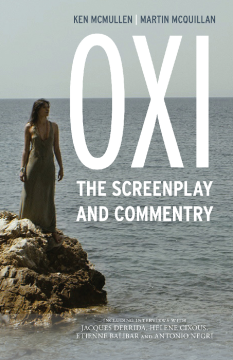
Additional Information
Book Details
Abstract
Oxi (Gr. Determiner, lit. ‘No’, fig. ‘Resistance’, pronounced ‘ochi’) retells Sophocles’ Antigone through the contemporary Greek crisis and modern European philosophy. A collaboration between the renowned British auteur Ken McMullen and the literary theorist Martin McQuillan, the film draws upon and responds to the importance of the Antigone of modern thought (Hegel, Arendt, Lacan, Derrida, Butler), while coming up close to the politics of the street and the malign effects of the austerity experiment in Greece today.
The screenplay weaves together a range of idioms, including performance, fiction, documentary, interview and literary collage. The result is an intensely moving reflection on the tragedy of austerity today, with contributions from Hélène Cixous, Etienne Balibar and Antonio Negri, as well as several significant figures in Greek cultural life. The volume includes full transcripts of the interviews with Cixous, Balibar and Negri, and a previously unpublished interview with Jacques Derrida on the question of Oedipus, as well as critical commentary from the filmmakers.
Martin McQuillan is Professor of Literary Theory and Cultural Analysis and Dean of the Faculty of Arts and Social Sciences at Kingston University, UK, where he is also Co-Director of The London Graduate School. He is a literary theorist, cultural critic and author and editor of many books and essays including Roland Barthes (or the profession of cultural studies), Deconstruction After 9/11and Deconstruction Reading Politics.
Ken McMullen is one of Britain’s leading auteurs. His films include Partition, Zina and Ghost Dance. His work has represented the UK at Cannes, won the gold medal at the New York Film Festival, the special jury prizes at Chateau Thierry and San Sebastian, and Best Film at the Rotterdam Film Festival. He is currently Distinguished Anniversary Chair of Film at Kingston University.
Ken McMullen’s film OXI offers a fierce critique of the economic policy that underlies the Greek crisis, representing what is happening in terms of the irresoluble conflicts of tragedy: between the demands of humanity and care and the imperatives of the market. This timely publication of the screenplay of the film, accompanied by some powerful critical essays, brings out the significance of the perspective of the humanities in such a crisis, to guard against the danger of treating economics as the master science.
Mary Margaret McCabe, Keeling Scholar in Residence and Honorary Professor, University College London
Oxi is a film and an act of resistance, a way of countering the conditions of a current crisis or drama. This 'drama' - the word means crossroads or crisis - reveals our own indebtedness to Greece; and Oxi thereby addresses the very nature of our present global financial crisis. To read this is to affirm something other than debt: Oxi also says ‘ναι’ – yes - to a different modernity, a different set of global arrangements.
Thomas Docherty, Professor of English and Comparative Literature, University of Warwick
